|
|
|
Sort Order |
|
|
|
Items / Page
|
|
|
|
|
|
|
| Srl | Item |
| 1 |
ID:
151000
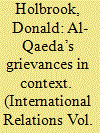

|
|
|
|
|
| Summary/Abstract |
At a time when political debate in the West is preoccupied with the perceived impact of extremist ideas on individuals who embrace or support terrorism, this article uses the publicly articulated grievances of Ayman al-Zawahiri, Al-Qaeda’s most prolific ideologue, as a case study to examine how a globally focused and distributed extremist narrative matches political realities on the ground. The approach of the article is to compare two political processes: the approach of Islamist extremists, as represented by Zawahiri, to constitutional reform as articulated through public appeals to potential supporters versus the reality of constitutional amendments and evolution of fundamental law in the Middle East and South Asia. Incorporating insights from studies on law and society and International Relations, the article demonstrates how Zawahiri’s interpretation of religious law emphasises wholesale adoption of sharia while the process of legal reform has invariably resulted in the creation of legal hybrids, mixing Islamic and non-Islamic legal traditions. This is not an article about theology or religious law but an effort to dissect the public relations of an international terrorist movement. The analysis pays particular attention to events in Zawahiri’s native Egypt, where evolving grievances concerning a series of constitutional amendments – including those following the Arab revolutions and the toppling of Mohammed Morsi – are assessed.
|
|
|
|
|
|
|
|
|
|
|
|
|
|
|
|
| 2 |
ID:
133849
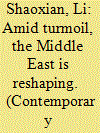

|
|
|
|
|
| Publication |
2014.
|
| Summary/Abstract |
Turmoil in Iraq reached a new level when ISIL seized Mosul after the Iraq security force collapsed on June 10. Although ISIL, the Islamic State in Iraq and the Levant , look after over Fallujah in early 2014, this latest development has deeper repercussions. On June 29, ISIL declared a large territory between Iraq and Syria a new state.
|
|
|
|
|
|
|
|
|
|
|
|
|
|
|
|
| 3 |
ID:
132823
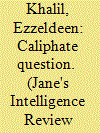

|
|
|
|
|
| Publication |
2014.
|
| Summary/Abstract |
The emergence of the Islamic State from its previous ISIL incarnation has reshaped the international jihadist community. Ezzendeen, Khalil analyses reactions to the group's metamorphosis among Islamist militant circles and its likely evolution.
|
|
|
|
|
|
|
|
|
|
|
|
|
|
|
|
| 4 |
ID:
139359
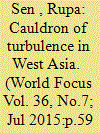

|
|
|
|
|
| Summary/Abstract |
The US occupation of Iraq in 2003 resonated the death knell of a republican, modern, secular, nationalist Iraqi state and the calibrated intention to undermine all existing solidarities by institutionalizing perennial sectarian conflicts. The Americans resolved, remaking the whole of West Asia to suit their economic and political interests, which implied the commencement of an imbroglio that would thereafter sweep the Arab world at least for a couple of decades.
|
|
|
|
|
|
|
|
|
|
|
|
|
|
|
|
| 5 |
ID:
150807
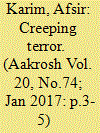

|
|
|
|
|
| Summary/Abstract |
The Islamic State of Iraq and the Levant (ISIL) may be forced to retreat
from Iraq-Syria under relentless pressure from forces allied with
Western powers, but the retreat is going to be painfully slow and
despite retreat, ISIL will be far from being finally defeated. If ousted
from west Asia, ISIL is likely to relocate in Africa and the Af-Pak and
launch new offensives. It is already gradually moving to the south
Asian region, which has the largest congregation of Sunni Muslims,
who support the ISIL ideology. South Asia will also provide ISIL greater
safety from Western forces and open opportunities to spread its
tentacles in various countries of the south and central Asian region. If
it eventually moves to south Asia in force, India will face a new,
dangerous challenge from Islamic forces.
|
|
|
|
|
|
|
|
|
|
|
|
|
|
|
|
| 6 |
ID:
183730
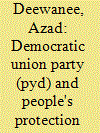

|
|
|
|
|
| Summary/Abstract |
This article explores the construction of the Syrian Kurdish Democratic Union Party (PYD) and the People's Protection Units (YPG) in Turkish official discourse. In the article, I employ critical discourse analysis (CDA) to analyze written texts produced during the years 2014–2019 that reflect the position of the Turkish authorities. The article sets out the main narratives that construct the PYD and YPG as terrorist organizations and posits them as a threat to both Turkey and the international community. The analysis reveals that these narratives serve the purpose of delegitimizing the PYD and YPG and legitimizing Turkish military operations and violations against Syrian Kurds. It highlights that the Turkish official position regarding the PYD and YPG is driven by two ideological factors: first, the influence of Kurdish autonomy in Syria on the action of Kurds in Turkey, and second, the barrier that the PYD and YPG have created against the Islamist agenda of Turkey's Justice and Development Party (AKP) in Syria.
|
|
|
|
|
|
|
|
|
|
|
|
|
|
|
|
| 7 |
ID:
186865
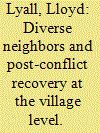

|
|
|
|
|
| Summary/Abstract |
Why do some towns recover faster than others after intrastate conflict? Many important decisions about post-conflict recovery are made at the substate level, but little empirical work has investigated what causes differences in recovery outcomes within a country. This article suggests that proximity to ethno-religiously diverse neighbors slows a town’s post-conflict recovery. A town has ‘diverse neighbors’ if towns with different plurality ethno-religious groups are nearby. This hypothesis is tested by exploring variation in recovery speed among Iraqi towns after the 2014–17 Islamic State insurgency (ISIL). The article constructs 81-month panels of economic activity for 379 Iraqi settlements occupied by ISIL by using satellite-observed nighttime light emissions as a proxy for economic activity. The panels reveal large variation in post-conflict recovery among towns during the first year of peace. Village-level survey data are then used to construct a measure of neighbor diversity, which is combined with lighting-based recovery scores in spatial autoregression. The results show that greater neighbor diversity is robustly associated with slower settlement recovery. The neighbor diversity penalty cannot be fully explained by cleavages between groups ‘on opposite sides’ of the conflict; proximity to out-group neighbors appears to slow recovery even between wartime allies. Several explanations are considered, and this article suggests that the types of post-liberation controllers that arise in diverse areas – which tend to be substate militias rather than the government – may be one important mechanism.
|
|
|
|
|
|
|
|
|
|
|
|
|
|
|
|
| 8 |
ID:
139120
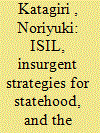

|
|
|
|
|
| Summary/Abstract |
What do we know about the US-led coalition's chance of defeating the Islamic State in Iraq and the Levant (ISIL)? Exploring a number of past wars between state and non-state forces, I argue that while the war with ISIL may become protracted and last long, ISIL's chance of winning is after all slim. Primary reasons for this optimism lie in the combination of ISIL's self-destructive actions, which are likely to alienate much of its popular and financial base, and the transformation of US-led military operations in Iraq and Syria.
|
|
|
|
|
|
|
|
|
|
|
|
|
|
|
|
| 9 |
ID:
159233
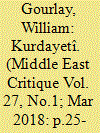

|
|
|
|
|
| Summary/Abstract |
The advance of ISIL amid the horrors of the Syrian civil war has given impetus to the forging of political solidarity among Kurds across international borders. This article examines Kurdayetî, pan-Kurdish identification, and the way in which it is shaped by ongoing crises in the Middle East. Amid chaotic events, previously divided Kurdish populations have increased cross-border interaction and co-operation. In northern Syria, Kobani became a bellwether of pan-Kurdish hopes and fears, and a rallying point, with peshmerga from Iraqi Kurdistan passing through Turkey to help relieve the ISIL siege of the city. Meanwhile, Kurdish political groups, particularly the PYD in Syria and the Kurdistan Regional Government, have made strategic gains, raising prospects, in some quarters, of Kurdish independence. Kurdish military forces also have won international recognition (and some logistical support) for the significant role they have played in fighting ISIL. This, in turn, has heightened concerns among regional states, chiefly Turkey, which is traditionally wary of political advances for the Kurds. This article incorporates ethnographic data gathered in 2014 and 2015 in Diyarbakır and Istanbul, to analyze the surge in pan-Kurdish solidarity, confidence and political assertiveness, and the implications these have for the Kurds and the states that surround them.
|
|
|
|
|
|
|
|
|
|
|
|
|
|
|
|
| 10 |
ID:
177707
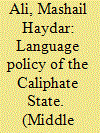

|
|
|
|
|
| Summary/Abstract |
This article examines and critiques the macro top-down constitutional language policy of the so-called the Caliphate State, often referred to by the acronyms ISIS and ISIL. Although Sharicah law, claimed to be the only source of the Caliphate’s laws, does not legislate local, official and national language policies, the Caliphate constitutionalises language policy through the misappropriation of Quranic verses. Article 8 of the constitution mandates the adoption of Arabic as the exclusive national and official language of the Caliphate project and its educational system. The monolithic policy exploits the symbiosis between Arabic and Islam to uproot the Islamic tradition of diversity and plurilingualism, advance its homogenising discourse, and globalise militancy. A religiously justified language policy is instrumental for the Caliphate in achieving cultural and linguistic cleansing, propagating its religious-political ideology and maintaining a strict assimilatory mould of indoctrination.
|
|
|
|
|
|
|
|
|
|
|
|
|
|
|
|
| 11 |
ID:
161652
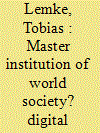

|
|
|
|
|
| Summary/Abstract |
In English School theory, the putative change from an international society of states to a world society of individuals is usually associated with the diffusion of a benign form of cosmopolitanism and the normative agenda of solidarism. Consequently, the notion that world society might enable alternative expressions of transnational politics, independent from international society, remains underdeveloped. Drawing on the literature of contentious politics and social movements, this article challenges orthodox accounts and suggests that the global proliferation of digitally mediated linkages between individuals and nonstate actors constitutes a fundamental challenge to traditional dynamics of interstate communication in the form of the diplomatic system. This provides an opportunity to reconceptualize world society as an alternative site of politics distinct from mainstream international society and generative of its own logic of communication, mobilization, and action. The 2011 events in Egypt and the ongoing digital presence of the so-called Islamic State are used to demonstrate how massive increases in global interaction capacity are transforming the pathways for political contention and collective mobilization worldwide.
|
|
|
|
|
|
|
|
|
|
|
|
|
|
|
|
| 12 |
ID:
141583
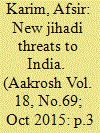

|
|
|
| 13 |
ID:
131884
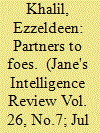

|
|
|
| 14 |
ID:
141586
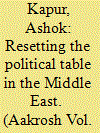

|
|
|
| 15 |
ID:
155769
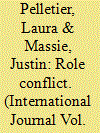

|
|
|
|
|
| Summary/Abstract |
This paper seeks to understand the peculiarity of the Trudeau government’s decision to withdraw Canadian fighter jets from Iraq and Syria. Most studies have focused on electoral turnover to account for early withdrawal from coalition operations. Yet no study offers a plausible explanation for why a centrist challenger, such as Trudeau, favoured early withdrawal despite public support and alliance pressure for continued involvement, and committed when in power to a bolder and riskier mission while withdrawing valued military assets from coalition operations. Building on foreign policy role theory, we argue that role conflict best explains the particularity of the Trudeau government’s withdrawal decision. In the wake of the 2015 federal election, the Liberal Party of Canada witnessed an intra-party conflict over which role to perform between that of a faithful ally and a good international citizen. The party leader finally proposed a compromise mission making Canada more involved on the frontlines.
|
|
|
|
|
|
|
|
|
|
|
|
|
|
|
|
| 16 |
ID:
131200
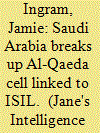

|
|
|
| 17 |
ID:
138892
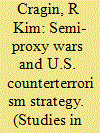

|
|
|
|
|
| Summary/Abstract |
On 4 February 2014, Al Qaeda leaders in Pakistan (aka Al Qaeda Central) repudiated Abu Bakr al-Baghdadi, the leader of Al Qaeda in Iraq. Ayman al-Zawahiri declared that al-Baghdadi and his newly formed Islamic State in Iraq and the Levant (ISIL) were no longer part of Al Qaeda's organization and Al Qaeda Central could not be held responsible for ISIL's behavior. It represents the first time that Al Qaeda Central has renounced an affiliate publicly. The announcement was driven by months of fighting between ISIL and Jabhat al-Nusra, another Al Qaeda affiliate in Syria. In fact, in Syria, Al Qaeda fighters are competing against each other for influence, as well as against other opposition groups, the Syrian regime, the Islamic Revolutionary Guard Corps, Iraqi militiamen, and Lebanese Hezbollah. This chaotic, semi-proxy war is unlike any previous problem encountered, made even more challenging by the limited U.S. presence on-the-ground. More worrisome, this semi-proxy war also has spread beyond Syria. Similar dynamics have emerged in Iraq, Yemen, and Lebanon to a certain extent. This article argues that these dynamics necessitate a twist in U.S. counterterrorism strategy.
|
|
|
|
|
|
|
|
|
|
|
|
|
|
|
|
| 18 |
ID:
137792
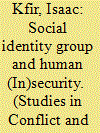

|
|
|
|
|
| Summary/Abstract |
The article uses social identity group theory and human insecurity to examine the rise of the Islamic State in Iraq and the Levant (ISIL). After first defining social group identity and its characteristics, the article reviews the Al Qaeda ideology that serves as the foundation of ISIL, before turning attention to the message and legacy of Abu Musab al-Zarqawi and their profound influence on ISIL. The article concludes by arguing that only by ending the marketplace of identities can stability be restored to Iraq and Syria.
|
|
|
|
|
|
|
|
|
|
|
|
|
|
|
|
| 19 |
ID:
139695
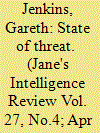

|
|
|
| 20 |
ID:
156915
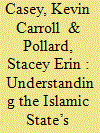

|
|
|
|
|
| Summary/Abstract |
While many researchers have examined the evolution and unique characteristics of the Islamic State (IS), taking an IS-centric approach has yet to illuminate the factors allowing for its establishment in the first place. To provide a clearer explanation for IS’s successes and improve analysts’ ability to predict future occurrences of similar phenomena, we analyze IS’s competitive advantages through the lens of two defining structural conditions in the Middle East North Africa (MENA): failure of state institutions and nationhood. It is commonly understood that the MENA faces challenges associated with state fragility, but our examination of state and national resiliency shows that Syria and Iraq yield the most deleterious results in the breakdown of the nation, suggesting that the combined failure of state and nation, as well as IS’s ability to fill these related vacuities, is a significant reason IS thrives there today. Against this backdrop, we provide a model of IS’s state- and nation-making project, and illustrate IS’s clear competitive advantages over all other state and non-state actors in both countries, except for Kurdish groupings. We conclude with recommendations on how policy-makers may begin halting and reversing the failure of both state and nation in Iraq and Syria.
|
|
|
|
|
|
|
|
|
|
|
|
|
|
|
|
|
|
|
|
|